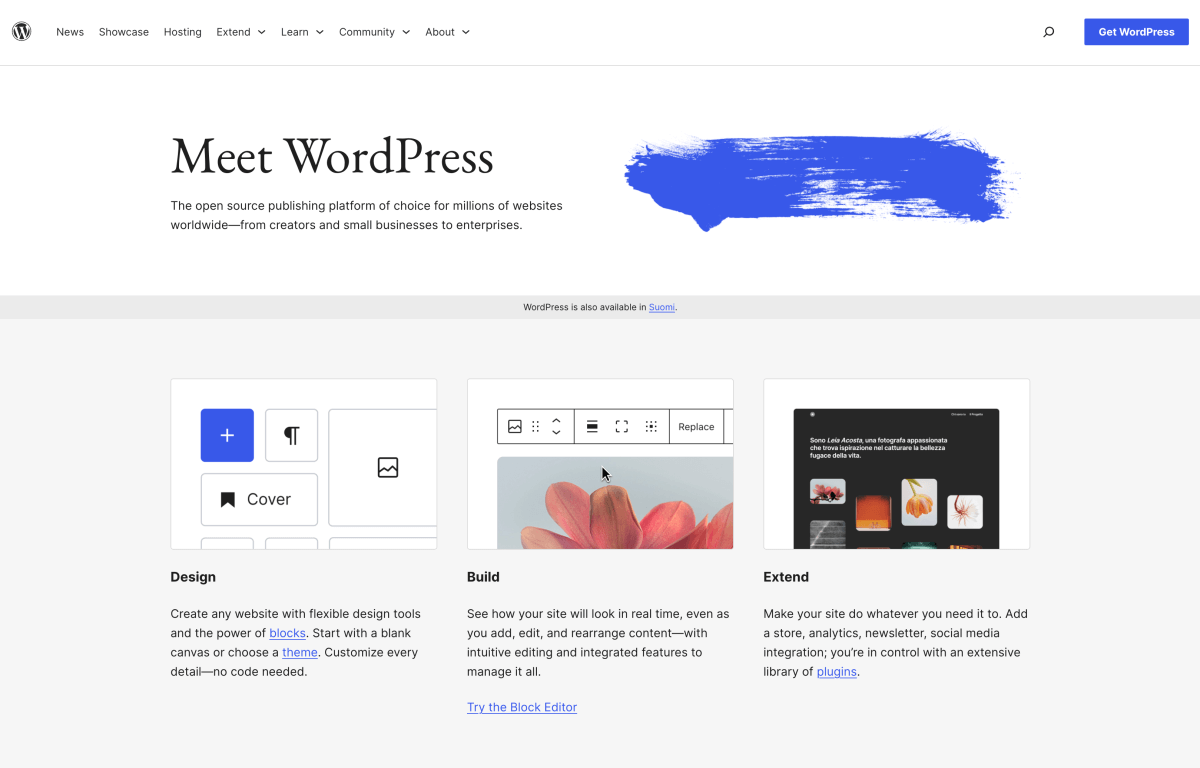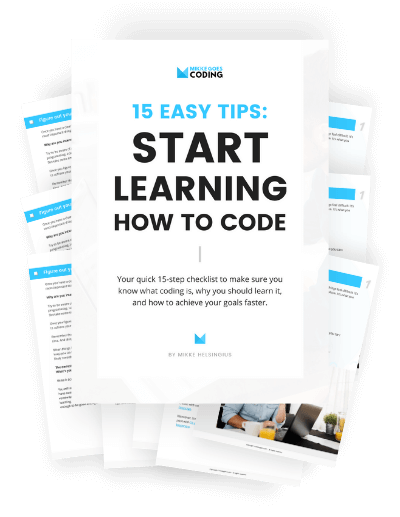Are you trying to decide which programming language to learn?
If you are new to coding, you may have heard of PHP. But you may be wondering:
- What is PHP exactly?
- What is PHP used for?
- Is PHP easy to learn?
- Where should I start learning PHP?
If any of these questions sound familiar, you are in the right place.
PHP is a popular programming language that powers 76% of all websites out there. So many businesses use it that it’s hard to imagine PHP becoming obsolete anytime soon.
That’s why choosing to learn PHP for beginners is an excellent choice for anyone who wants to launch a lucrative career in tech.
For beginners, PHP is an easy programming language to learn and there are a ton of resources and tutorials available online.
Whatever your current skill and experience level with coding and web development is, this guide will help you decide if you should learn PHP or not.
Are you ready? Let’s jump right in!
Table of contents
- What is PHP?
- What can you use PHP for?
- Why learn PHP? (5 crucial reasons)
- Is PHP difficult to learn?
- When should you learn PHP?
- How long does it take to learn PHP?
- Where to learn PHP for beginners?
- Next steps after learning PHP
Please note: This post contains affiliate links to products I use and recommend. I may receive a small commission if you purchase through one of my links, at no additional cost to you. Thank you for your support!
What is PHP?
PHP is a server-side scripting language developers use to create interactive and dynamic websites.
The acronym stands for PHP Hypertext Preprocessor, so yes, “PHP” is actually part of the acronym it stands for. But when the language first appeared in 1994, it stood for “Personal Home Page”.

PHP is a programming language for back-end web development. It works hand-in-hand with HTML.
But unlike HTML and CSS, PHP runs on the web server, processing inputs from website user interactions and delivering dynamic web page content back to their browsers.
Thus, you can connect PHP to a database and store, manage, and process user data, such as usernames, passwords, and other account details.
Since PHP code runs on servers, it works differently than client-side scripting languages like JavaScript. Client-side code runs on the user’s computer and directly in their web browser.
Although PHP is a relatively old language, it’s still hugely important and relevant:
According to the TIOBE Index, PHP is currently the 17th most popular programming language worldwide.
But at the same time, PHP is used by over 76% or all the websites whose server-side programming language we know. That’s a market share of over 3/4, meaning there’s a lot of demand for skilled PHP developers in the job market.

What can you use PHP for?
PHP is clearly the programming language for back-end web development. So, you might be wondering: “What can I do with PHP, then?”
Here are a few examples of where PHP can be used:
1. Website programming
PHP is one of the most popular languages for back-end web development. You can embed PHP scripts in HTML files to convert a static web page into a dynamic one.
In other words, PHP allows you to generate dynamic web page content by fetching information from a database.
Dynamic here means that your web page can display different content to different user. For example, when a user logs in to your website, you can use PHP to display their account details or a feed of their friends’ most recent posts.
Dynamic websites allow users to interact and engage with them, too.
For more details, read my guide on how web applications work.
2. WordPress themes and plugins
PHP is the programming language of WordPress. If you’re not familiar, WordPress is the #1 most popular and widely-used content management system (CMS) worldwide.
WordPress is a powerful platform for all types of websites: blogs, business websites, portfolios, or online stores.
Since PHP allows us to build dynamic websites, it’s perfect for systems like WordPress.

All WordPress themes and plugins are built with PHP, too. Themes allow you to change the look and design of your WordPress website, while plugins add new functionalities and features.
Thus, if you are interested in becoming a WordPress developer or build WordPress-based websites as a freelance web developer, you need to learn PHP.
Read more in my guide on why you should use WordPress for your next website project.
3. E-commerce stores
Many of the most popular e-commerce platforms like WooCommerce (for WordPress) and Magento are built with PHP.
Hence, PHP is a valuable skill if you want to run your own e-commerce store or manage online shops for other businesses, for example.
Learning PHP means that you won’t have to rely on external developers and you can customize your e-commerce store to perfectly fit your goals.

Why should you learn PHP?
Here are a few reasons to take your time to learn PHP this year:
- Solid popularity:
PHP is used by 76% of all the websites whose server-side programming language is known. It’s also the 11th most popular programming language used by professional developers. - Extensive support resources:
Because PHP is so popular, you can find plenty of helpful guides and resources out there. - Decent amount of job openings:
Currently you can find 947 jobs on Indeed that mention “php developer”. - Lucrative career:
PHP developers earn an average base salary of $85,261/year in the US. - WordPress and ecommerce:
WordPress powers 43% of all websites worldwide. If you are looking to start a blog or an e-commerce store, learning PHP is especially helpful.
Is PHP difficult to learn?
Before you start learning PHP, you surely want to know what to expect in terms of difficulty.
Let me say this first: learning any programming language is difficult. You need to practice a lot and it takes commitment and dedication to become a skilled programmer.
So, how does PHP compare against other popular languages? Is PHP easier or more difficult than other programming languages?
The truth is:
PHP is a relatively easy programming language to learn for beginners. If PHP is your first programming language, it won’t be too difficult.
You have a detailed PHP documentation to reference and you can find tons of helpful articles, guides, and discussion threads. I use the PHP threads on Stack Overflow a lot, for example.
There are plenty of beginner-level PHP online courses, YouTube channels, and tutorials available, too.
Summing it up: yes, it will take hard work to master PHP, but the language itself isn’t difficult.
Therefore, you can focus your time and effort on learning how to think like a programmer instead of battling with cryptic, complex syntax.

When to learn PHP?
If you are new to coding, you may be wondering when it’s the right time to learn PHP.
Should you learn HTML and CSS before PHP?
Or perhaps another programming language like JavaScript or Python?
If PHP is your first language, I suggest you get familiar with HTML and some CSS first. Since PHP works seamlessly together with those two, it’s helpful to know the basics of both HTML and CSS.
When you start learning PHP, a basic understanding of fundamental programming concepts helps, too. If you are familiar with variables, conditionals, loops, and functions, you can learn PHP a lot faster.
If you aren’t sure whether to learn PHP or another programming language like Python, JavaScript, Ruby, or Java, then your choice depends on your goals. Each language is simply a tool for building certain types of projects:
- PHP is used for server-side website development
- Python is great for data analysis, machine learning, web app development
- Javascript is used for website development and back-end scripting
- Ruby is used for web application development
- Java is used for Android mobile apps, web apps, and desktop software
Thus, make sure you learn a language that allows you to build projects you want to work with.
For example, if you want to become a front-end web developer, you should learn JavaScript.
If you are interested in creating mobile apps for Android devices, learn Java.
If you want to become a data scientist or machine learning engineer, learn Python.
For more details, check out my free guide on what programming language you should learn.
How long does it take to learn PHP?
The next question on your mind is probably:
How long will it take me to learn PHP?
It all boils down to what you want to achieve and how much time you can dedicate to a regular learning routine.
The only way to learn PHP is to practice as much as you can. Learning it is just like learning anything else that’s new to you: it takes hard work and there are no shortcuts.
Your PHP learning journey can be broken down into two phases:
Phase 1: Learning the basics
First, you have to learn the basics and the PHP syntax (the rules of the language). You need to learn how variables, data structures, conditionals, loops, arrays, functions, and other fundamental programmatic concepts work.
An introductory PHP course like Learn PHP usually takes somewhere between 25–50 hours.
If you study for two hours every day, you could finish a course in 13–25 days. If you can study for two hours every other day, your first course would take 3 to 7 weeks.
Bear in mind that this is only the first stepping stone for becoming a PHP developer. Before you can build practical website projects, you need to take your time to learn how the language works.
Phase 2: Deepening your knowledge with practice
Once you got the basics down, it’s time to learn how to use PHP.
This is the most critical phase, since you can’t become a PHP developer if you don’t know how to apply PHP to practical, real-life projects.
Your goal is to gain as much real-world experience through planning, executing, and maintaining website projects of your own.
You can add your projects to your developer portfolio to showcase your best work samples to potential employers.
Deepening your knowledge to become a skilled PHP developer can take anywhere from several months to several years.
If you work hard, it’s realistic to be ready for your first entry-level job in about 9–18 months.
Where to learn PHP for beginners
Here are the best online courses and tutorials to learn PHP from scratch:
1. Learn PHP (Codecademy)
Learn PHP is a 25-hour course where you will learn fundamental programming concepts like variables, functions, arrays, HTML form handling, conditionals and logic, loops, and more.

2. PHP for Beginners – Become a PHP Master – CMS Project (Udemy)
PHP for Beginners teaches you everything you need to become a professional PHP developer with hands-on, real-world exercises and projects.
With 37 hours of video lessons and lifetime access to the curriculum, this course is my #1 recommended resource for learning PHP from scratch.

Throughout the course, you will build a fully-functional content management system from scratch that works similarly to WordPress or Drupal.
With this knowledge, there’s no limit to what kind of websites you can create. You could build a social network, an e-commerce platform, and much more.
3. Build a Social Network from Scratch: JavaScript PHP + MySQL (Udemy)
Build a Social Network from Scratch is a fun beginner-level PHP course where you build a real-life social network website from scratch, much like Twitter or Facebook.

The course includes 17 hours of easy-to-digest video lessons, walking you through each individual element of your social network one by one. You will walk away with an entire toolkit of in-demand skills: PHP, HTML, CSS, JavaScript, jQuery, and mySQL.
4. W3Schools PHP Tutorial
W3Schools’ PHP Tutorial is the perfect place to start learning PHP programming from absolute scratch. You will learn go through practical exercises, quizzes, and examples along the way.
5. Practical PHP: Master the Basics (Udemy)
Practical PHP is a free beginner-friendly PHP course on Udemy created by Brad Hussey. If you want to learn how to create dynamic websites from scratch, and you are new to coding, this might be the course you are looking for.
6. Web Applications for Everybody Specialization (Coursera)
Web Applications for Everybody is a comprehensive specialization or certification program on Coursera offered by the Michigan University.

This learning path teaches you how to build web applications from scratch using PHP. To get a thorough understanding of how PHP works, you start by learning the basic structure of the web application.
You will also create several web apps for your developer portfolio. Hence, this course prepares you for entry-level PHP web developer jobs even if you are entirely new to tech.
7. PHP Fundamentals (Pluralsight)
If you are familiar with Pluralsight, PHP Fundamentals is the perfect course to start your web development learning journey.
This course teaches you the foundations of PHP on the “LAMP stack” (Linux, Apache, MySQL, and PHP). You will learn the syntax of PHP and the simplicities of form processing, including functions, arrays, classes, operators, database integration, and more.

8. PHP The Right Way
PHP The Right Way is a collection of resources you can use for a quick reference when working on your PHP projects, with best practices and links to other helpful PHP online resources.

Next steps after learning PHP
The best way to learn PHP is to practice as much as you can by building projects for your developer portfolio.
Once you feel comfortable working with PHP and creating practical, helpful web applications from scratch, make sure you add your best work samples to your developer portfolio.
A professional-looking portfolio website is like your online business card. Anyone around the world can access it, browse your projects, and get in touch with you.
Therefore, remember to add your contact details to your portfolio and keep them up-to-date.
But where should you go once you have learned how to build real-world projects with PHP?
Let’s look at two alternative PHP developer career paths:
Path 1: Become a freelance PHP web developer
If you want to be your own boss, have ultimate freedom in life, and work from anywhere on the planet, freelancing might be your thing.
Freelance PHP developers work for small and large businesses, building dynamic websites for them and managing existing web-based projects.
Here are a few advantages of becoming a freelance PHP developer:
- Start earning while you learn:
You can apply for small freelance jobs while you are still learning. Browse job openings on Upwork.com, for example, to get a better idea of what types of beginner-level jobs are available. - Enjoy total freedom in life:
Freelancers can choose their clients and decide when and where they work. - Spend more time with family and friends:
Because you aren’t tied to regular working hours, you can spend more time with your loved ones. - Tap into the massive demand for skilled WordPress developers:
WordPress powers over 40% of all websites worldwide. Since it’s built with PHP, you could specialize in WordPress (like I have) and the seemingly endless job opportunities it offers. - Earn a lucrative salary:
The average annual salary for a PHP developer in the US is $102,005.
To get started, check out my free guide on how to become a freelance web developer.

Path 2: Land a full-time PHP developer job
If you want job security and a steady income, a full-time PHP developer position could be the best way to go.
PHP developers work across all industries worldwide. They are responsible for developing
Here are a few advantages of becoming a full-time PHP developer:
- Attain job security:
Compared to freelancing, a full-time job gives more security and predictability when it comes to your earnings. - Enter a growing job market:
According to the U.S. Bureau of Labor Statistics, the employment of web developers and digital designers – including PHP developers – is projected to grow 13% from 2020 to 2030, which is faster than the average for all occupations. - Work in an industry you love:
PHP powers almost 80% of all dynamic websites worldwide across all industries, including the ones you are genuinely interested in. - Earn a lucrative salary:
The average salary for a PHP developer is $84,655 per year in the United States.
How can you become a full-time PHP developer, then?
Here are the steps for landing your first entry-level PHP developer job:
- Learn how PHP works:
PHP for Beginners is a great place to start since you will build a full-scale CMS project throughout the course. - Practice your skills (and then practice more):
Practice makes perfect! Work on PHP coding projects of your own as much as you can. Learn how to use PHP to create useful, meaningful web apps. - Showcase your best work samples in your portfolio:
Be mindful of what your ideal employer wants to see and set up a portfolio website where you show them your best projects. - Apply for entry-level jobs before you feel ready:
Even if you don’t have 100% of the skills listed in the job ad, apply anyway. You have nothing to lose! If a potential employer likes your portfolio, that’s all that matters. Once you’ve made a good first impression, you are more likely to hear from them in the future.
Summing it up: What is PHP and how to learn it
If you are new to coding and you’re wondering “What is PHP and should I learn it?”, I hope you found a few helpful answers and resources in this guide!
PHP is a popular, powerful programming language that’s been around for almost 30 years now.
It offers a plethora of different job opportunities and its popularity won’t decline anytime soon thanks to its extensive use and WordPress.
So, where should you start?
If you are entirely new to PHP, start with the free Learn PHP course on Codecademy.
Once you get a hang of how the language works and you want to learn more in-depth skills, go with PHP for Beginners or Build a Social Network from Scratch. Both courses teach you how to build fully functional, real-world web applications with PHP. These are the exact skills you will need every day as a PHP developer.
Now it’s your turn: share your thoughts in the comments below!
Are you going to learn PHP this year? What are your goals with the language? I can’t wait to hear about your plans!
Here are a few related guides you may find helpful:
- The Best Websites to Learn How to Code (With No Experience)
- 20+ Best Web Development Books for Beginners
- 12 Proven Ways to Make Money Coding (Without a Degree)
Happy coding!
– Mikke



I recently stumbled upon your blog and I must say, it’s very valuable for anyone who want to know about PHP. Your explanation of PHP’s fundamentals and its practical applications is clear and concise, making it perfect for beginners.
Thank you for providing such valuable resources for aspiring PHP developers!
Didn’t know you had comments activated but I appreciate all the information that you share with us! Thanks so much! =)
Hi Toy,
glad to hear you’re finding a few helpful tips in my articles! Thanks for your lovely feedback 🙂
Cheers,
Mikke